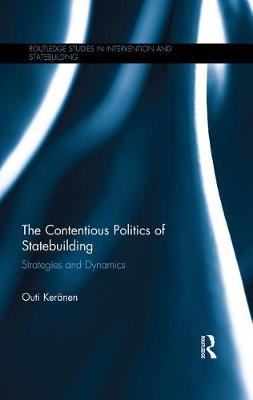Routledge Studies in Intervention and Statebuilding
1 total work
The Contentious Politics of Statebuilding
Published 21 April 2017
The book examines the dynamics between domestic and international statebuilding actors.
While the dynamics between "local" and "international" statebuilding actors have been previously theorised through concepts such as hybridity and friction, there have been few attempts to develop conceptual tools for the empirical study of statebuilding dynamics. By drawing on a set of concepts and mechanisms developed in the Contentious Politics literature, this book fills this gap. It deploys concepts such as political opportunity structures, mobilizing structures and framing to trace the interactions between domestic and international statebuilding actors in the case of post-conflict Bosnia and Herzegovina. The analysis identifies a set of practices operating at various domains of Bosnia's society-institutional, symbolic and discursive-through which domestic statebuilding actors seek to influence the internationally-driven statebuilding process. Responses by the international statebuilding actors to such activities have often resulted in further contention. The book argues that the dynamics between the different statebuilding actors and agendas in the Bosnian case are characterised not only by conflict and contention but also symbiosis whereby the presence of non-conforming local actors justifies the extension of international mandates while the continued international presence generates further contestation. These observations and the conceptual tools introduced in the book add to our understanding of the often slow and arduous statebuilding processes in post-conflict societies.
This book will be of much interest to students of statebuilding, peacebuilding, European politics and international relations in general.
While the dynamics between "local" and "international" statebuilding actors have been previously theorised through concepts such as hybridity and friction, there have been few attempts to develop conceptual tools for the empirical study of statebuilding dynamics. By drawing on a set of concepts and mechanisms developed in the Contentious Politics literature, this book fills this gap. It deploys concepts such as political opportunity structures, mobilizing structures and framing to trace the interactions between domestic and international statebuilding actors in the case of post-conflict Bosnia and Herzegovina. The analysis identifies a set of practices operating at various domains of Bosnia's society-institutional, symbolic and discursive-through which domestic statebuilding actors seek to influence the internationally-driven statebuilding process. Responses by the international statebuilding actors to such activities have often resulted in further contention. The book argues that the dynamics between the different statebuilding actors and agendas in the Bosnian case are characterised not only by conflict and contention but also symbiosis whereby the presence of non-conforming local actors justifies the extension of international mandates while the continued international presence generates further contestation. These observations and the conceptual tools introduced in the book add to our understanding of the often slow and arduous statebuilding processes in post-conflict societies.
This book will be of much interest to students of statebuilding, peacebuilding, European politics and international relations in general.
